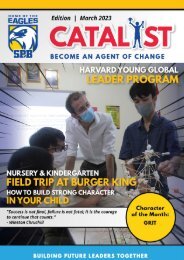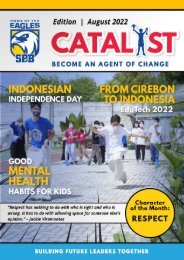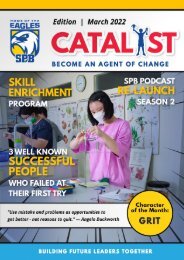SPB News April 2020
Monthly insight of student and teacher activities at Sekolah Pelita Bangsa Cirebon
Monthly insight of student and teacher activities at Sekolah Pelita Bangsa Cirebon
Create successful ePaper yourself
Turn your PDF publications into a flip-book with our unique Google optimized e-Paper software.
SPB PARENTING TIPS 3
SPB PARENTING TIPS 3
Optimism and motivation: keys to your
child’s success
By GreatSchools Staff
Two psychologists describe the
inborn optimism and motivation that
drive children to learn and develop
— and how you can nurture those
traits.
Have you ever wondered how:
An 18-month-old knows if he keeps
making noises eventually you will
understand what he’s communicating?
A 3-year-old knows if she keeps
scribbling someday people will recognize
what she’ s making?
A 4-year-old knows if he keeps looking
at the words on the page one day he’ll be
able to read?
These behaviors can be best explained
by the concept of instinctual optimism,
one of the two early, critical keys for
successful learning. A child doesn’t have
to learn by experience alone because
24
natural instinct also guides her.
With her inborn optimism, she remains
confident that, no matter what challenges
she faces, with perseverance she will
ultimately succeed. Instinctual optimism
is a quality that we believe is genetically
driven in our species and is the engine
that drives children’s daily quest to
understand and master the world
around them. All children come into the
world with instinctual optimism, some
to a much greater extent than others,
depending on their temperament.
Children’s curiosity, driven by their
instinctual optimism, is all the reward
or reinforcement they need to engage
in new activities. This internal drive is
known as intrinsic motivation, the second
critical key to academic success. Young
children engage in activities not because
they receive external motivators, but
because they simply enjoy the activities.
Supporting students’ motivation and
optimism at school
When any child struggles with instinctual
optimism and intrinsic motivation,
we must guide and provide her with
experiences that will further develop
those qualities. It’s understandable that
such a child will be prone to see her
mistakes as failures, to avoid academic
challenges, ultimately developing a
helpless or hopeless approach to school.
It’s reasonable to think that offering her an
external payoff will motivate her to engage
in a difficult task, yet doing so may well
dampen her natural motivation.
We’re not suggesting that grades,
rewards, punishments, or competition
should be banished from our educational
system, but rather that we must strike
a balance between the use of external
rewards and the reinforcement of intrinsic
motivation. Intrinsic motivation drives
self-reinforcement, which we believe is
the foundation of academic success, even
more important than intellect, ability and
opportunity.
Research and real-life strategies to help
kids
There are many ways to strengthen
children’s inborn motivation and
optimism. Psychologist Edward Deci at
the University of Rochester proposes
that people’s intrinsic motivation thrives
in environments that meet their most
significant needs. He highlights three such
needs: To belong and feel connected,
To feel a sense of autonomy and selfdetermination
and To feel competent.
It’s important for parents, educators and
other professionals to keep these needs
in mind and to establish conditions that
will nurture motivation and hope in the
children they care about.
Source: https://bit.ly/34irfNb
Helping children succeed in school
In school, educators should insure that
they teach students in ways in which they
can learn and succeed, recognizing that all
youngsters have different learning styles.
Helping children succeed in their areas of
interest
As a parent, you can help your child feel
competent in his strengths by making
sure he has opportunities to engage in his
interests. Recognizing the importance of
honoring his child interests and talents.
Providing your child with opportunities to
help others
Another strategy for fortifying islands of
competence and intrinsic motivation is to
provide youth with opportunities to help
others. Kids who engage in contributing
to the well-being of others experience
satisfaction, feelings of competence and
an increased motivation to pursue various
activities, even those they previously
found difficult.
As a parent you can help your child
become more comfortable with mistakes
by not reacting to your child’s mistakes
with judgmental or derogatory remarks.
Rather, you can use mistakes as teachable
and problem-solving moments.
Nurturing your child’s motivation and
optimism over time
Instinctual optimism and intrinsic
motivation appear to be integral
characteristics that drive each child
forward and which can be nurtured (or
undermined) throughout childhood.
Nurturing these qualities in some children
will require extra care, but the time and
energy adults expend in this way will
help strengthen children’s optimism and
motivation over time.
25

















